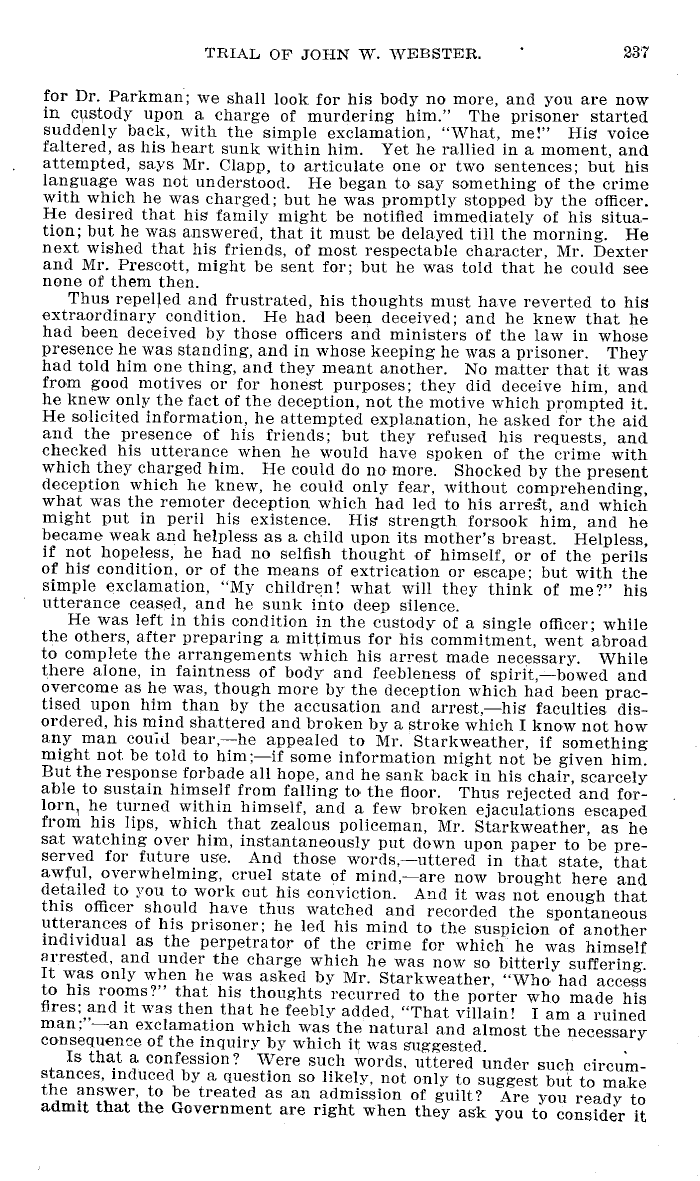|
TRIAL OF JOHN W. WEBSTER. 23'7
for Dr. Parkman; we shall look for his body no more, and you are now
in custody upon a. charge of murdering him." The prisoner started
suddenly back, with the simple exclamation, "What, me!" His voice
faltered, as his heart sunk within him. Yet he rallied in a moment, and
attempted, says Mr. Clapp, to articulate one or two sentences; but his
language was not understood. He began to say something of the crime
with which he was charged; but he was promptly stopped by the officer.
He desired that his family might be notified immediately of his situa-
tion; but he was answered, that it must be delayed till the morning. He
next wished that his friends, of most respectable character, Mr. Dexter
and Mr. Prescott, might be sent for; but he was told that he could see
none of them then.
Thus repelled and frustrated, his thoughts must have reverted to his
extraordinary condition. He had been deceived; and he knew that he
had been deceived by those officers and ministers of the law in whose
presence he was standing, and in whose keeping he was a prisoner. They
had told him one thing, and they meant another. No matter that it was
from good motives or for honest purposes; they did deceive him, and
he knew only the fact of the deception, not the motive which prompted it.
He solicited information, he attempted explanation, he asked for the aid
and the presence of his friends; but they refused his requests, and
checked his utterance when he would have spoken of the crime with
which they charged him. He could do no more. Shocked by the present
deception which he knew, he could only fear, without comprehending,
what was the remoter deception which had led to his arrest, and which
might put in peril his existence. His strength forsook him, and he
became weak and helpless as a child upon its mother's breast. Helpless,
if not hopeless, he had no selfish thought of himself, or of the perils
of his condition, or of the means of extrication or escape; but with the
simple exclamation, "My childre'n! what will they think of me?" his
utterance ceased, and he stink into deep silence.
He was left in this condition in the custody of a single officer; while
the others, after preparing a mittimus for his commitment, went. abroad
to complete the arrangements which his arrest made necessary. While
there alone, in faintness of body and feebleness of spirit,-bowed and
overcome as he was, though more by the deception which had been prac-
tised upon him than by the accusation and arrest,-his faculties dis-
ordered, his mind shattered and broken by a stroke which I know not how
any man could bear-he appealed to Mr. Starkweather, if something
might not. be told to him;-if some information might not be given him.
But the response forbade all hope, and he sank back in his chair, scarcely
able to sustain himself from falling to the floor. Thus rejected and for-
lorn, he turned within himself, and a few broken ejaculations escaped
from his lips, which that zealous policeman, Mr. Starkweather, as he
sat watching over him, instantaneously put down upon paper to be pre-
served for future use. And those words,-uttered in that state, that
awful, overwhelming, cruel state of mind,-are now brought here and
detailed to you to work out his conviction. And it was not enough that
this officer should have thus watched and recorded the spontaneous
utterances of his prisoner; he led his mind to the suspicion of another
individual as the perpetrator of the crime for which he was himself
arrested, and under the charge which he was now so bitterly suffering.
It was only when he was asked by Mr. Starkweather, "Who had access
to his rooms?" that his thoughts recurred to the porter who made his
fires; and it was then that he feebly added, "That villain! I am a ruined
man;"-an exclamation which was the natural and almost the necessary
consequence of the inquiry by which it was suggested.
Is that a confession? Were such words, uttered under such circum-
stances, induced by a question so likely, not only to suggest but to make
the answer, to be treated as an admission of guilt? Are you ready to
admit that the Government are right when they ask you to consider it
|

